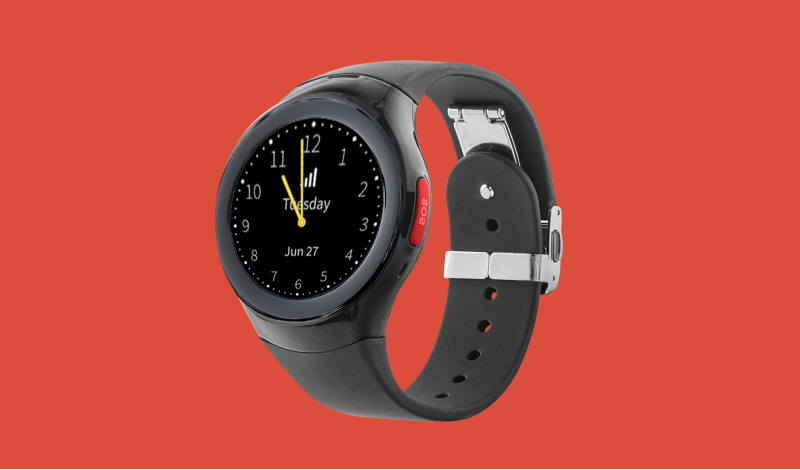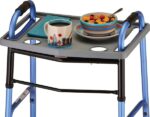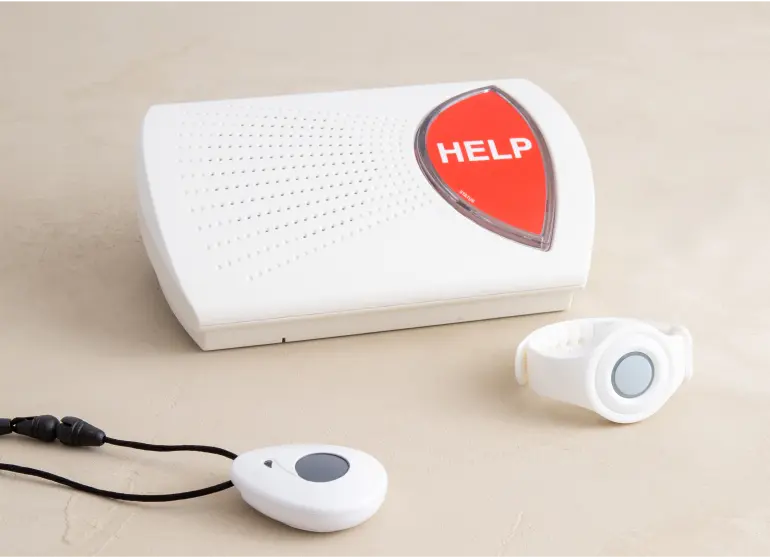Walkers are one of the most popular mobility aids for older adults, and there’s a good reason for their widespread use. They come in different styles and sizes, catering to various needs and abilities. Plus, they’re designed to be easily folded and transported, whether for a quick trip in the car or longer journeys. The right walker can boost independence while providing seniors and their families with confidence and reassurance.
Selecting the ideal walker for a senior can be challenging, especially with the wide range of choices available. However, with some guidance, you can make an informed decision and select a walker that’s safe, comfortable, and tailored to the senior’s specific requirements. In this blog post, we’ll explore some of the top walkers for seniors on the market, considering factors like stability, durability, and user-friendliness.
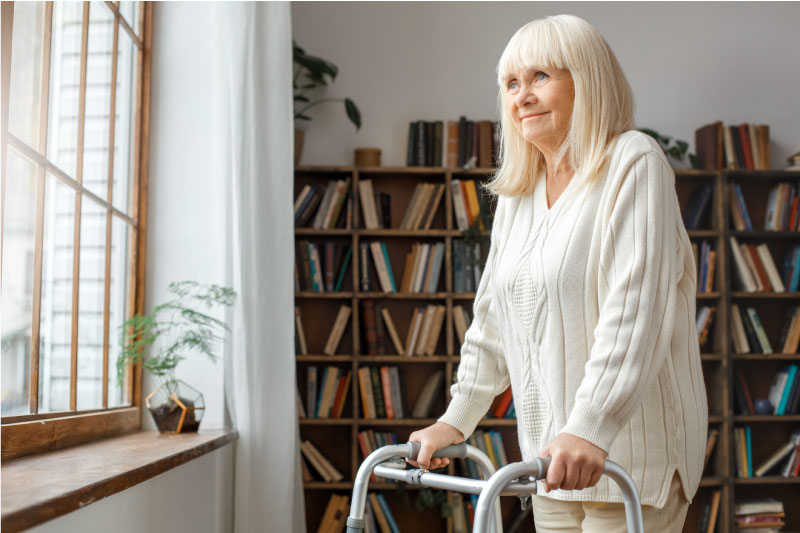
Benefits of Walkers for Seniors
Balance challenges, limited range of motion, decreased endurance, and other factors can lead an older adult to need a walker. Fortunately, walkers are designed to make getting around the house and performing daily activities outside of the house easier and safer. Benefits of walkers include:
- Increased Stability and Safety: Walkers provide seniors with extra support and stability while walking. This can help prevent falls and make it easier to navigate uneven or slippery surfaces.
- Improved Mobility: With the help of a walker, seniors can walk further and for longer periods of time than they would be able to without one. This can improve overall health and well-being by increasing physical activity levels.
- Independence: Using a walker can allow seniors to remain independent and continue doing the activities they enjoy, such as walking outdoors or shopping.
- Reduced Strain on Joints: Walkers can help distribute weight evenly, reducing strain on joints and making walking more comfortable.
- Customizable: There are a variety of walkers available with different features, such as adjustable height and wheels, making it easy to find one that fits a senior’s specific needs.
Best Standard Walkers
Standard walkers are one of the simplest types of mobility aids, consisting of a lightweight frame with four legs and no wheels. They are generally used indoors and provide excellent stability and support for people who require assistance with balance and walking. Standard walkers require lifting and moving for each step, making them a good option for those who need to build strength and improve their gait.
Buy Now – Best Overall Standard Foldable Walker
| Image | Product Name | Material | Feature | Weight Capacity | Height Adjustable | Amazon Prime | Buy Now |
|---|---|---|---|---|---|---|---|
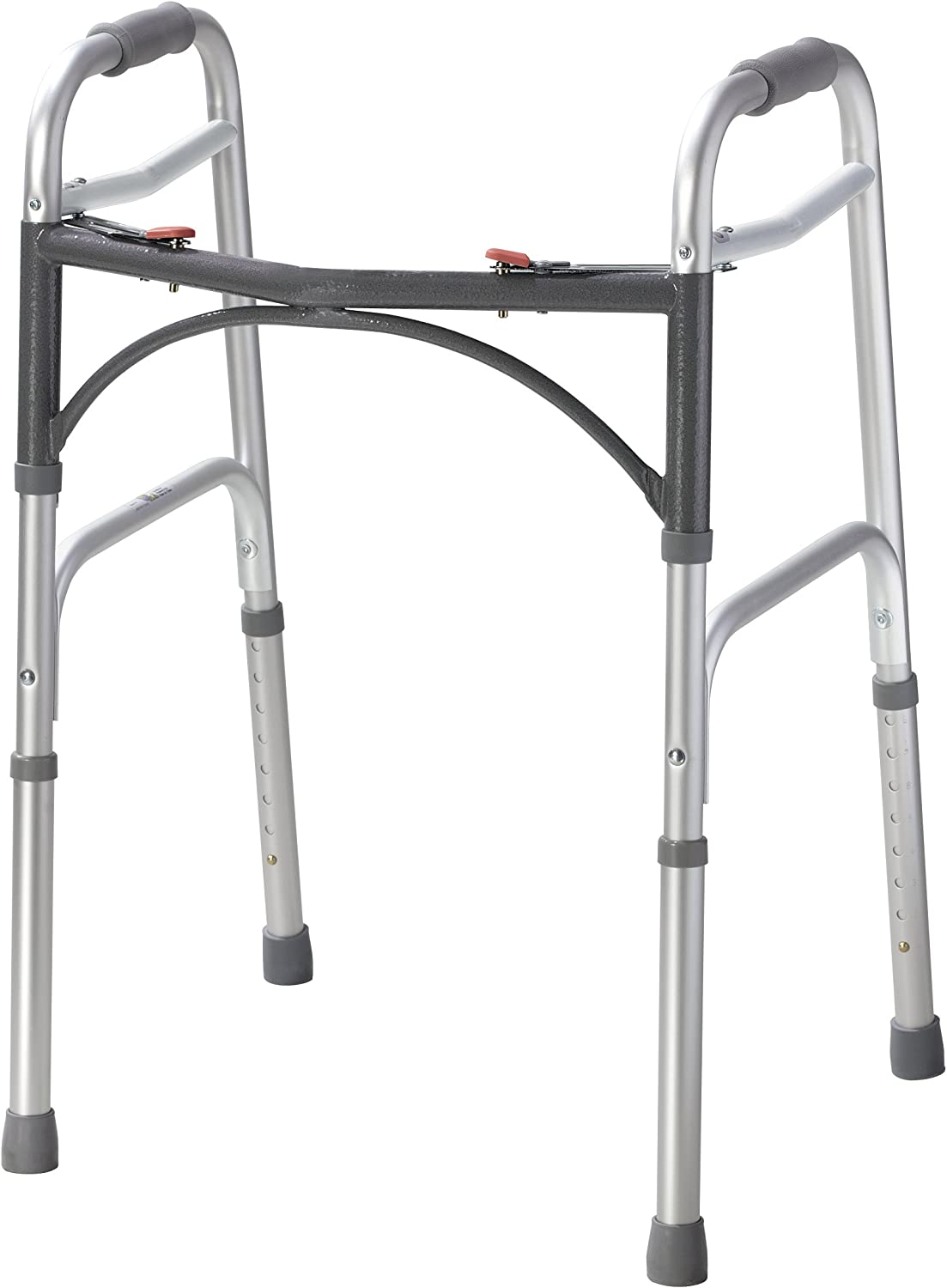 | Drive Medical 10200-1 Deluxe 2-Button Folding Walker, Silver | Aluminum | Foldable | 350 lbs | Yes | Yes | Buy Now |
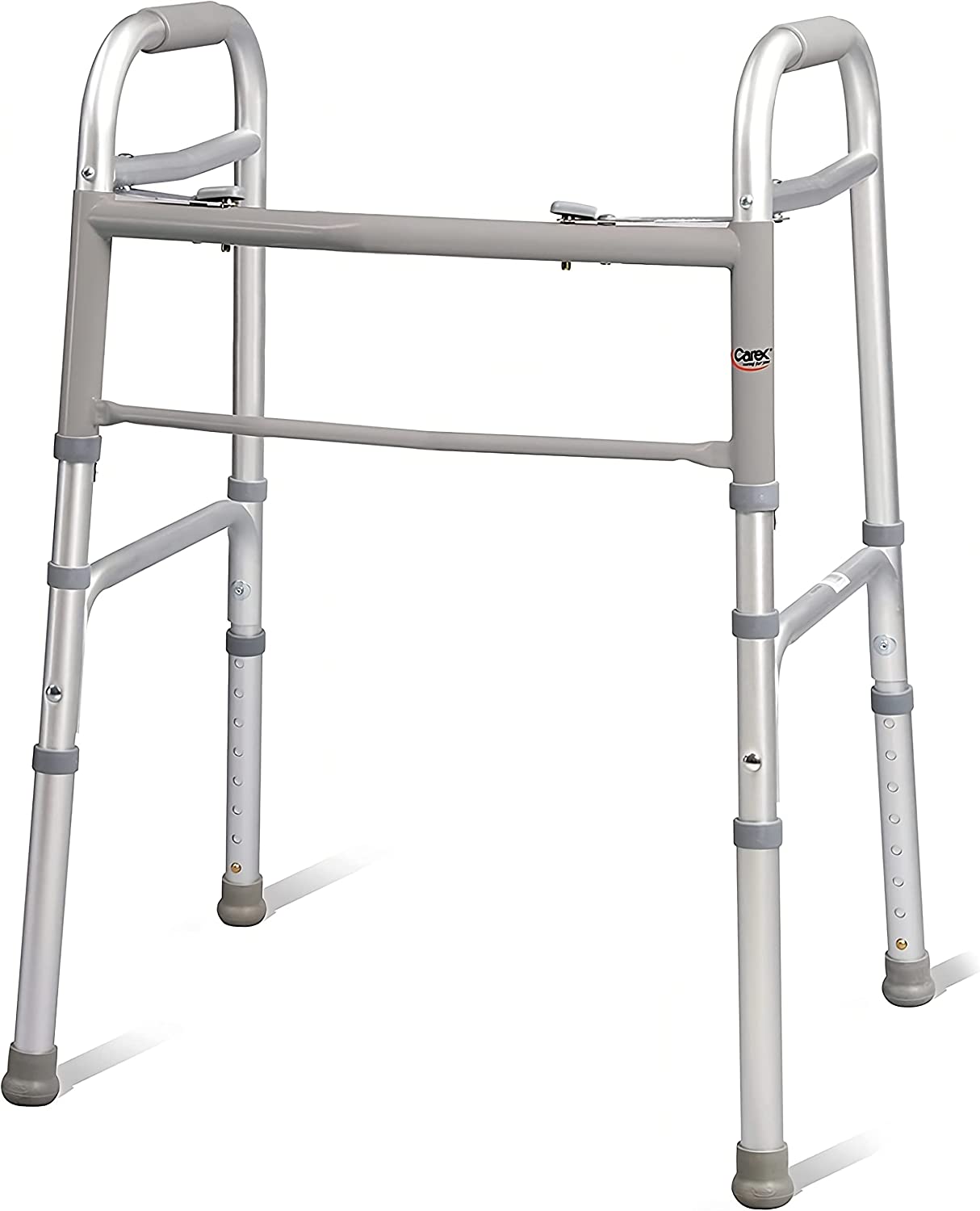 | Carex Lightweight Folding Walker for Seniors | Aluminum | Foldable | 300 lbs | Yes | Yes | Buy Now |
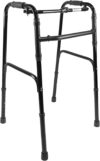 | PEPE Mobility Folding Walker without wheels for seniors | Aluminum | Foldable | 220 lbs | Yes | Yes | Buy Now |
Best Wheeled & Rollator Walkers
Wheeled walkers, also known as rollators, are walkers with wheels attached to the legs of the frame, providing more mobility than standard walkers. The wheels make it easier to maneuver over various surfaces, both indoors and outdoors. The handlebars usually have brakes to slow or stop the walker, providing additional safety and control for the user. Some rollator walkers also have a seat, which comes in handy when the user needs a rest. You can find rollator walkers with thicker wheels as well if you plan on using yours outdoors or on more rugged terrain.
Buy Now – Best Seller 4-Wheel Rollator Walker with Seat & Removable Back Support
| Image | Product Name | Material | Weight Capacity | Height Adjustable | Prime | Shop |
|---|---|---|---|---|---|---|
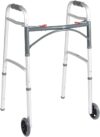 | Drive Medical 10210-1 Deluxe 2-Button Folding Walker with Wheels | Aluminum | 350 lbs | Yes | Yes | Buy Now |
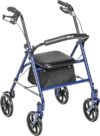 | Drive Medical 10257BL-1 4-Wheel Rollator Walker With Seat & Removable Back Support, Blue | Metal | 300 lbs | Yes | Yes | Buy Now |
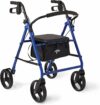 | Medline Standard Steel Folding Rollator Walker with 8" Wheels | Steel | 350 lbs | Yes | Yes | Buy Now |
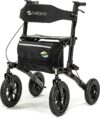 | Helavo Foldable All Terrain Walker with Seat - Outdoor Walker for Seniors with Large 12" Pneumatic Tires | Aluminum | 300 lbs | Yes | Yes | Buy Now |
6 Things to Look for When Choosing the Right Walker
Understanding what walker options are out there is your first step in choosing one that is best for you. Work closely with your physician and physical therapist to continue your research so that you can find a walker that will suit your current and future needs. Here are a few other considerations a professional would walk you through during a consultation.
- Consider the User’s Needs: When choosing a walker, consider the user’s height, weight, and mobility level. For example, a lightweight walker with wheels may be more suitable for someone who needs extra support but still has some mobility.
- Adjustable Height: It’s important to choose a walker with adjustable height to ensure that it fits the user’s specific needs and provides proper support.
- Weight Capacity: Make sure to choose a walker with a weight capacity that exceeds the user’s weight.
- Maneuverability: If the walker will be used indoors, make sure it is easy to maneuver in tight spaces.
- Comfort: Look for walkers with comfortable grips and padded seats to ensure maximum comfort while walking.
- Ease of Use: Find a walker that is easy to brake, fold up, unfold, and use in day-to-day life.
When should someone use a walker?
As we age, many of us experience a decrease in mobility and balance, which can make it challenging to walk safely and comfortably. This is where walkers come in – they are an excellent tool for seniors who want to maintain their independence and mobility. It is a valuable tool that can help individuals maintain their independence and mobility while reducing the risk of falls and injuries.
While walkers are available in many pharmacies or online stores, it is still crucial to consult with your physician and physical therapist before purchasing one. Your therapist will help you size your walker appropriately so that it is comfortable and safe, and they will also show you the right way to use it. So many times, seniors incorrectly walk with their walker, which can lead to an increase in fall risk.
How much do walkers cost?
The cost of a walker can vary depending on several factors, such as the type of walker, features, and brand. On average, basic walkers without wheels can cost around $30 to $50, while walkers with wheels can range from $60 to $200. Rollator walkers, which are walkers with wheels and a seat, can cost between $70 to $500, depending on the brand and features. Bariatric walkers, which are designed to support heavier weight capacity, can cost between $100 to $600.
Will Medicare cover my walker?
It’s important to note that some insurance plans, including Medicare, may cover the cost of a walker if it is deemed medically necessary. However, coverage and requirements vary by plan, so it’s important to check with your insurance provider to determine if a walker is covered and what the process for obtaining one may be. Additionally, some nonprofit organizations and local charities may provide free or low-cost mobility aids to individuals who qualify based on their financial situation.
Walkers can provide seniors with increased stability, mobility, and independence, while also reducing strain on joints. When choosing a walker, it’s important to consider the user’s specific needs and look for features such as adjustable height, weight capacity, maneuverability, and comfort. By choosing the right walker, seniors can continue to enjoy an active lifestyle and maintain their independence.
Accessories for Walkers
There are many accessories for walkers that can make yours even more convenient. It’s important to note that you do not need to purchase any walker accessory in order for it to be safer or better. In fact, too many accessories on a walker can clutter the walker and impede safe movement.
However, it can be fun to look for accessories that meet a need or express your style, such as a storage basket or bag.

Haley Burress – Writer, Senior Health Expert
Haley is a freelance writer specializing in senior health, caregiver support, and other topics relevant to older adults and aging. For more than 15 years, she had the honor of working in various senior living communities serving residents, families, and professional caregivers in local and national leadership roles. She uses that experience and those opportunities as she writes reliable, relatable, and realistic information that is designed to both educate and empower.
Over the past decade, Haley has had the opportunity to write informational resources, including extensive caregiver curriculum and training, for small and large senior service organizations. Her readers expect her to break down the sometimes overwhelming and frustrating information that comes with navigating senior living research, Medicare, and other social-emotional health topics.
When she isn’t writing at her desk (or at a corner table at her favorite coffee shop), Haley is usually walking her dog Junie around the neighborhood, exploring a new trail with her husband and teenage son, or sweating out stress on her Peloton bike. Just like other writers, Haley almost always has her nose in a book.
She takes her role as a senior living and caregiver expert seriously! You can find her elsewhere on the internet, such as her website or LinkedIn.



